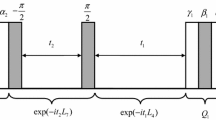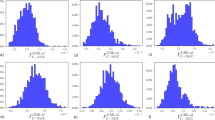Abstract
In this study, optimal control methods for quantum gate preparation are investigated. Quantum computation demands very high fidelity and requires controls to be easily tunable to achieve different computational tasks. Here, NOT and Controlled-NOT gates are prepared using four optimal control approaches on single- and two-qubit spin systems. Techniques we employed and compared are Krotov method, gradient ascent pulse engineering (GRAPE), chopped random basis optimization (CRAB) and gradient optimization of analytic controls (GOAT). For the preparation of NOT gate both unitary and Lindbladian dynamics are considered. From the numerical simulations, it is observed that GOAT achieves better results as compared to Krotov, GRAPE and CRAB, in terms of minimum infidelity, algorithmic simplicity and analyticity.















Similar content being viewed by others
Explore related subjects
Discover the latest articles, news and stories from top researchers in related subjects.References
Nielsen, M.A., Chuang, I.L.: Quantum Computation and Quantum Information, 10th edn. Cambridge University Press, Cambridge (2010). https://doi.org/10.1017/CBO9780511976667
Vandersypen, L.M., Chuang, I.L.: NMR techniques for quantum control and computation. Rev. Mod. Phys. 76(4), 1037 (2005)
Rowland, B., Jones, J.A.: Implementing quantum logic gates with gradient ascent pulse engineering: principles and practicalities. Philos. Trans. R. Soc. A 370(1976), 4636 (2012)
Veldhorst, M., Yang, C., Hwang, J., Huang, W., Dehollain, J., Muhonen, J., Simmons, S., Laucht, A., Hudson, F., Itoh, K.M., et al.: A two-qubit logic gate in silicon. Nature 526(7573), 410 (2015)
Zu, C., Wang, W.B., He, L., Zhang, W.G., Dai, C.Y., Wang, F., Duan, L.M.: Experimental realization of universal geometric quantum gates with solid-state spins. Nature 514(7520), 72 (2014)
Shim, Y.P., Tahan, C.: Semiconductor-inspired design principles for superconducting quantum computing. Nat. Commun. 7, 11059 (2016)
DAlessandro, D.: Small time controllability of systems on compact Lie groups and spin angular momentum. J. Math. Phys. 42(9), 4488 (2001)
Albertini, F., D’Alessandro, D.: Notions of controllability for bilinear multilevel quantum systems. IEEE Trans. Autom. Control 48(8), 1399 (2003)
Dür, W., Vidal, G., Cirac, J., Linden, N., Popescu, S.: Entanglement capabilities of nonlocal Hamiltonians. Phys. Rev. Lett. 87(13), 137901 (2001)
Kraus, B., Cirac, J.: Optimal creation of entanglement using a two-qubit gate. Phys. Rev. A 63(6), 062309 (2001)
Barenco, A., Bennett, C.H., Cleve, R., DiVincenzo, D.P., Margolus, N., Shor, P., Sleator, T., Smolin, J.A., Weinfurter, H.: Elementary gates for quantum computation. Phys. Rev. A 52(5), 3457 (1995)
DiVincenzo, D.P., Bacon, D., Kempe, J., Burkard, G., Whaley, K.B.: Universal quantum computation with the exchange interaction. Nature 408(6810), 339 (2000)
Makhlin, Y.: Nonlocal properties of two-qubit gates and mixed states, and the optimization of quantum computations. Quantum Inf. Process. 1(4), 243 (2002)
Zhang, J., Vala, J., Sastry, S., Whaley, K.B.: Geometric theory of nonlocal two-qubit operations. Phys. Rev. A 67(4), 042313 (2003)
Zhang, J., Whaley, K.B.: Generation of quantum logic operations from physical Hamiltonians. Phys. Rev. A 71(5), 052317 (2005)
Galiautdinov, A.: Generation of high-fidelity controlled-NOT logic gates by coupled superconducting qubits. Phys. Rev. A 75(5), 052303 (2007)
Geller, M.R., Pritchett, E.J., Galiautdinov, A., Martinis, J.M.: Quantum logic with weakly coupled qubits. Phys. Rev. A 81(1), 012320 (2010)
Pal, A., Rashba, E.I., Halperin, B.I.: Exact CNOT gates with a single nonlocal rotation for quantum-dot qubits. Phys. Rev. B 92(12), 125409 (2015)
Watts, P., Vala, J., Müller, M.M., Calarco, T., Whaley, K.B., Reich, D.M., Goerz, M.H., Koch, C.P.: Optimizing for an arbitrary perfect entangler. I. Functionals. Phys. Rev. A 91(6), 062306 (2015)
Goerz, M.H., Gualdi, G., Reich, D.M., Koch, C.P., Motzoi, F., Whaley, K.B., Vala, J., Müller, M.M., Montangero, S., Calarco, T.: Optimizing for an arbitrary perfect entangler. II. Application. Phys. Rev. A 91(6), 062307 (2015)
Palao, J.P., Kosloff, R.: Quantum computing by an optimal control algorithm for unitary transformations. Phys. Rev. Lett. 89(18), 188301 (2002). https://doi.org/10.1103/PhysRevLett.89.188301
Palao, J.P., Kosloff, R.: Optimal control theory for unitary transformations. Phys. Rev. A 68(6), 062308 (2003). https://doi.org/10.1103/PhysRevA.68.062308
Carlini, A., Hosoya, A., Koike, T., Okudaira, Y.: Time-optimal unitary operations. Phys. Rev. A 75(4), 042308 (2007)
Schulte-Herbrüggen, T., Spörl, A., Khaneja, N., Glaser, S.: Optimal control-based efficient synthesis of building blocks of quantum algorithms: A perspective from network complexity towards time complexity. Phys. Rev. A 72(4), 042331 (2005)
Nigmatullin, R., Schirmer, S.: Implementation of fault-tolerant quantum logic gates via optimal control. New J. Phys. 11(10), 105032 (2009)
Schulte-Herbrüggen, T., Spörl, A., Khaneja, N., Glaser, S.: Optimal control for generating quantum gates in open dissipative systems. J. Phys. B Atom. Mol. Opt. Phys. 44(15), 154013 (2011)
Zhou, W., Schirmer, S., Zhang, M., Dai, H.Y.: Bang-bang control design for quantum state transfer based on hyperspherical coordinates and optimal time-energy control. J. Phys. A Math. Theoret. 44(10), 105303 (2011)
Huang, S.Y., Goan, H.S.: Optimal control for fast and high-fidelity quantum gates in coupled superconducting flux qubits. Phys. Rev. A 90(1), 012318 (2014)
Bhole, G., Anjusha, V., Mahesh, T.: Steering quantum dynamics via bang-bang control: implementing optimal fixed-point quantum search algorithm. Phys. Rev. A 93(4), 042339 (2016)
Hirose, M., Cappellaro, P.: Time-optimal control with finite bandwidth. Quantum Inf. Process. 17(4), 88 (2018)
Wen, J., Cong, S.: Preparation of quantum gates for open quantum systems by Lyapunov control method. Open Syst. Inf. Dyn. 23(01), 1650005 (2016)
Silveira, H.B., da Silva, P.P., Rouchon, P.: Quantum gate generation for systems with drift in U (n) using Lyapunov–LaSalle techniques. Int. J. Control 89(12), 2466 (2016)
Khaneja, N., Reiss, T., Kehlet, C., Schulte-Herbrüggen, T., Glaser, S.J.: Optimal control of coupled spin dynamics: design of NMR pulse sequences by gradient ascent algorithms. J. Magn. Reson. 172(2), 296 (2005)
De Fouquieres, P., Schirmer, S., Glaser, S., Kuprov, I.: Second order gradient ascent pulse engineering. J. Magn. Reson. 212(2), 412 (2011)
Leung, N., Abdelhafez, M., Koch, J., Schuster, D.: Speedup for quantum optimal control from automatic differentiation based on graphics processing units. Phys. Rev. A 95(4), 042318 (2017)
Caneva, T., Calarco, T., Montangero, S.: Chopped random-basis quantum optimization. Phys. Rev. A 84(2), 022326 (2011)
Rach, N., Müller, M.M., Calarco, T., Montangero, S.: Dressing the chopped-random-basis optimization: A bandwidth-limited access to the trap-free landscape. Phys. Rev. A 92(6), 062343 (2015)
Machnes, S., Assémat, E., Tannor, D., Wilhelm, F.K.: Tunable, flexible, and efficient optimization of control pulses for practical qubits. Phys. Rev. Lett. 120(15), 150401 (2018)
Sørensen, J., Aranburu, M., Heinzel, T., Sherson, J.: Quantum optimal control in a chopped basis: applications in control of Bose–Einstein condensates. Phys. Rev. A 98(2), 022119 (2018)
Lindblad, G.: On the generators of quantum dynamical semigroups. Commun. Math. Phys. 48(2), 119 (1976)
Gorini, V., Kossakowski, A., Sudarshan, E.C.G.: Completely positive dynamical semigroups of N-level systems. J. Math. Phys. 17(5), 821 (1976)
Lendi, K.: Evolution matrix in a coherence vector formulation for quantum Markovian master equations of N-level systems. J. Phys. A Math. Gen. 20(1), 15 (1987)
d’Alessandro, D.: Introduction to Quantum Control and Dynamics. Chapman and Hall/CRC, New York (2007)
Dirr, G., Helmke, U.: Lie theory for quantum control. GAMM-Mitteilungen 31(1), 59 (2008)
Koch, C.P.: Controlling open quantum systems: tools, achievements, and limitations. J. Phys. Condens. Matter 28(21), 213001 (2016)
Schirmer, S.G., de Fouquieres, P.: Efficient algorithms for optimal control of quantum dynamics: the Krotov method unencumbered. New J. Phys. 13(7), 073029 (2011)
Boutin, S., Andersen, C.K., Venkatraman, J., Ferris, A.J., Blais, A.: Resonator reset in circuit QED by optimal control for large open quantum systems. Phys. Rev. A 96(4), 042315 (2017)
Machnes, S., Sander, U., Glaser, S., de Fouquieres, P., Gruslys, A., Schirmer, S., Schulte-Herbrüggen, T.: Comparing, optimizing, and benchmarking quantum-control algorithms in a unifying programming framework. Phys. Rev. A 84(2), 022305 (2011)
Ben-Israel, A.: A Newton-Raphson method for the solution of systems of equations. J. Math. Anal. Appl. 15(2), 243 (1966)
Nocedal, J., Wright, S.J.: Numerical Optimization, 2nd edn. Springer, Berlin (2006)
Nelder, J.A., Mead, R.: A simplex method for function minimization. Comput. J. 7(4), 308 (1965)
Lagarias, J.C., Reeds, J.A., Wright, M.H., Wright, P.E.: Convergence properties of the Nelder–Mead simplex method in low dimensions. SIAM J. Optim. 9(1), 112 (1998)
Horn, R.A., Johnson, C.R.: Matrix Analysis, 2nd edn. Cambridge University Press, Cambridge (2012). https://doi.org/10.1017/9781139020411
de Fouquieres, P.: Implementing quantum gates by optimal control with doubly exponential convergence. Phys. Rev. Lett. 108(11), 110504 (2012)
Zhu, W., Rabitz, H.: A rapid monotonically convergent iteration algorithm for quantum optimal control over the expectation value of a positive definite operator. J. Chem. Phys. 109(2), 385 (1998)
Author information
Authors and Affiliations
Corresponding author
Additional information
Publisher's Note
Springer Nature remains neutral with regard to jurisdictional claims in published maps and institutional affiliations.
Rights and permissions
About this article
Cite this article
Riaz, B., Shuang, C. & Qamar, S. Optimal control methods for quantum gate preparation: a comparative study. Quantum Inf Process 18, 100 (2019). https://doi.org/10.1007/s11128-019-2190-0
Received:
Accepted:
Published:
DOI: https://doi.org/10.1007/s11128-019-2190-0




